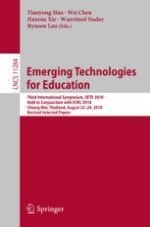This book constitutes the thoroughly refereed post-workshop proceedings of the Third International Symposium, SETE 2018, held in conjunction with ICWL 2018, Chiang Mai, Thailand, in August 2018.
The 23 full and 3 short papers were carefully reviewed and selected from 51 submissions. The papers have been organized in the following topical sections: Emerging Technologies of Design, Model and Framework of Learning Systems; Emerging Technologies Support for Intelligent Tutoring; Emerging Technologies Support for Game-Based and Joyful Learning; Emerging Technologies of Pedagogical Issues; UMLL (International Symposium on User Modeling and Language Learning); ETLTL (International Workshop on Educational Technology for Language and Translation Learning)
